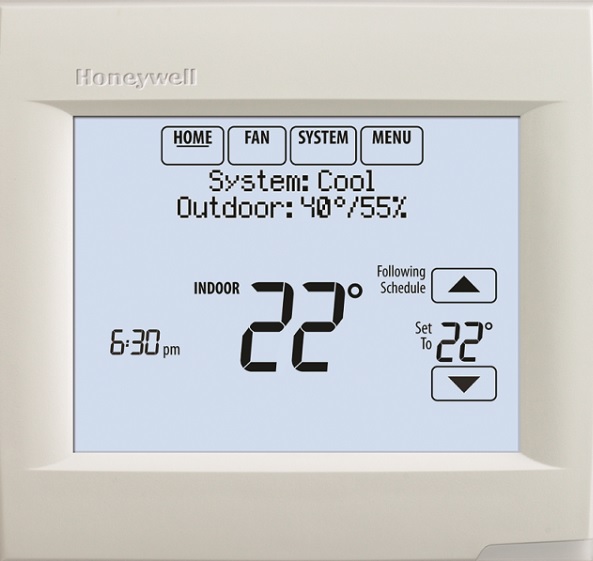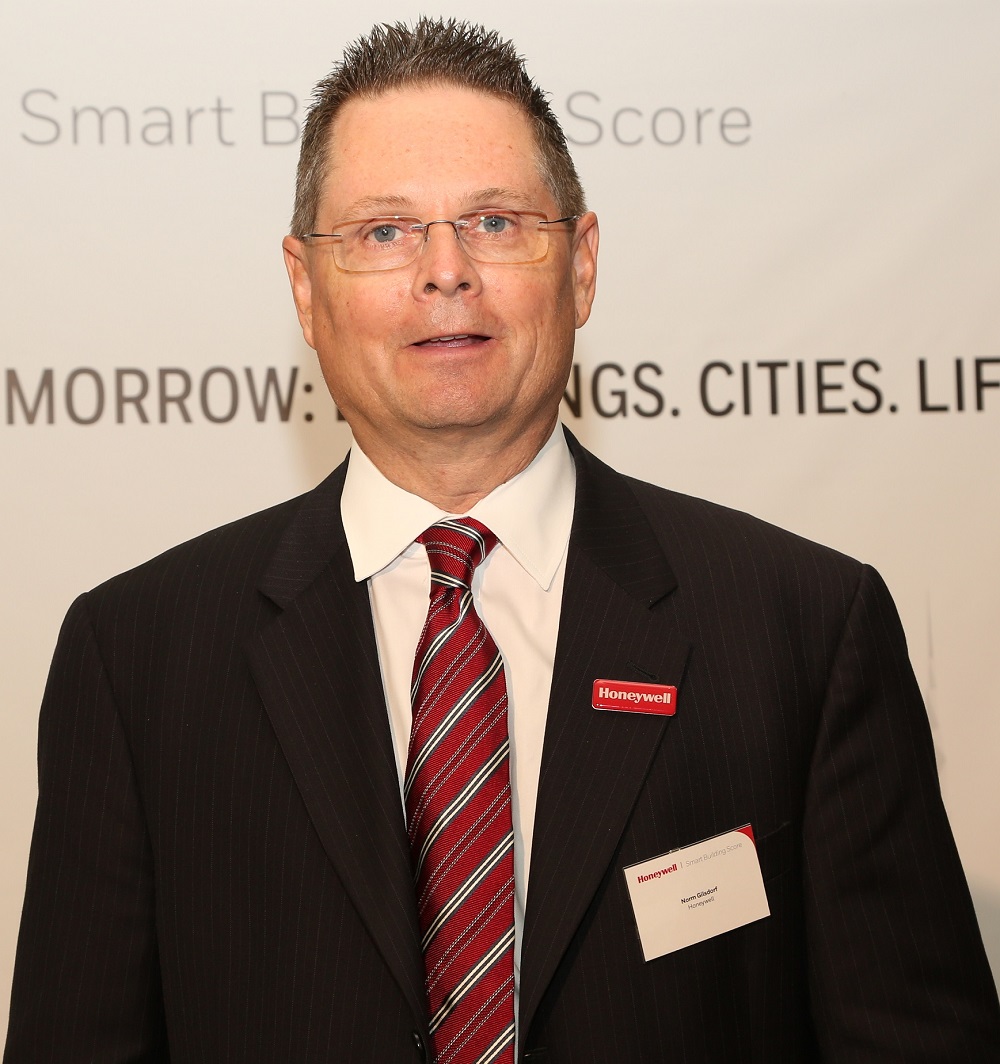Al Tawba Mosque cuts energy costs by 37% during a six-month pilot programme*

Honeywell’s VisionPRO 8000 thermostat for mosques
Dubai, UAE: Honeywell has announced the results of what is purportedly the first-of-a-kind thermostat pilot programme, conducted in Sharjah, United Arab Emirates, which indicates that mosques in the Middle East have the potential to cut their energy consumption by more than one-third through the use of ‘smart’ thermostats.
Honeywell’s VisionPRO 8000 thermostat for mosques, the announcement said, was piloted at the Al Tawba Mosque*, Sharjah, over a period of six months between August 2015 and January 2016, and is designed with an auto-azan feature that uses location coordinates to calculate prayer times and automatically adjusts temperature as per the time of the year. The results, the announcement highlighted, demonstrated year-over-year energy savings of 37%, equating to 778 kilowatts in reduced energy consumption. The findings, it added, have been endorsed by the Sharjah government’s Department of Islamic Affairs, which oversees mosques in the Emirate.
Revealing its other features, the announcement said that the thermostat has a ‘Holiday Mode’ with override switch for special occasions such as Ramadan, Eid and other religious holidays. The announcement also mentioned that the product’s ‘Adaptive Intelligent Recovery’ feature turns on the cooling system in advance to ensure the temperature reaches the optimal level at the desired time. Equipped with dual power supply that allows flexibility and ease in installation for new or retrofit mosques, the announcement added that the thermostat can be used in two heat/two cool DX units and includes a touch-screen interface.
As mosques often have large open spaces and with prayers taking place five times a day, Honeywell said that its technology has the potential to significantly reduce energy consumption while maintaining optimal comfort for worshippers during prayer times.
Honeywell also informed that the product supports the UAE’s Green Economy for Sustainable Development initiative, which aims to position the country as a hub for the export and re-export of green products and technologies.

Norm Gilsdorf, President for Middle East, Russia and Central Asia regions at Honeywell
“The mosque thermostat is a clear result of our ongoing commitment to provide our customers in the Middle East with energy-efficient and locally relevant solutions,” said Norm Gilsdorf, President for Middle East, Russia and Central Asia regions at Honeywell. “With this unique product, mosques in the region can be made more comfortable when required, while also providing an intuitive and sustainable solution for mosque caretakers during off-peak times.”
Dilip Sinha, General Manager for Honeywell Environmental and Energy Solutions in the Middle East, Turkey and Africa (META), said: “This product is an example of how Honeywell works to develop and adapt technology to serve the needs of its customers. In this case we designed the auto-azan feature to enhance existing Honeywell programmable thermostat technology to meet the cultural needs of the region and to help support the UAE’s sustainable development plans.”
Honeywell informed that following the encouraging results of the Sharjah pilot programme, it is conducting other pilot studies at various mosques in the United Arab Emirates and Saudi Arabia, with more being planned in other Middle Eastern countries.
[div class=”row”]
[div class=”col-md-10 col-md-offset-1 content-sidebox”]
A ‘smart’ approach to cooling
Speaking on the sidelines of the press conference to announce the results of the pilot project, Norm Gilsdorf, President for Middle East, Russia and Central Asia regions, Honeywell, and Mohamed Eltaweil, Product Marketing Manager (Middle East, Turkey & Africa), Honeywell, speak to Climate Control Middle East about the utility of the thermostat.
CCME: Is the installation of the thermostat a complex process? And is there a need for specialised expertise for commissioning the thermostat?
Norm: The thermostat is designed to give an easy user experience. It is a plug-and-play approach, where the user can connect to the existing wiring. Anybody can handle the commissioning. You don’t need technical expertise. You can set up the coordinates on your own. You don’t need a technician. The user needs to just refer to the manual. It requires very little intervention by the users.
CCME: Is your thermostat compatible with older air conditioning systems?
Norm: The thermostat is compatible with older systems, for example ducted splits. As such, ducted splits are connected to conventional thermostats with wires, so it is just a matter of replacing those with our thermostats, where you just connect to the existing wiring in the mosque. It is easy to adapt this unit. It has the same wiring structure and the same way of powering the system.
CCME: Can this thermostat be part of an IoT regime?
Norm: When you look at the distribution of mosques in the region, while here in Dubai, you have good Internet connectivity, in some remote areas, you don’t have that connectivity.
CCME: We have often seen air conditioning systems being over-designed, which means they shut off after the desired set-point temperature has been reached. The humidity, which is every prevalent, needs to be constantly treated, and when the air conditioning system shuts itself off, the humidity (moisture build-up) results in mould. Does your thermostat help in overcoming this IEQ-related problem?
Norm: In a normal thermostat, people switch off the AC after each prayer session, and that is where the problem with mould occurs. In the case of our thermostat, when you set it at 22 or 24 degrees C, you are avoiding the problem with humidity. It is running all the time, even during night time (for a duration of 8-9 hours), though at 28 degrees C. That way, there is no moisture build-up. This thermostat ensures the auto circulation of air. So we are able to avoid the humidity problem without any intervention.
CCME: Have you considered introducing the thermostat in schools and malls, as well, where there is so much of talk about trending and smart cooling.
Norm: We see a similarity, so soon you will see a product for malls. I believe that malls are either over-cooled or under-cooled, and so we are trying to understand the loading. We want to use it in a demand-response mode, as is the case in the United States, where it is becoming more costly to introduce more power.
In very big malls, you have a building automation system in place, which comes with a dashboard to take into factor trending and real time data. We are seeing the use of sensors to understand air flow and humidity.
Mohamed Eltaweil, Product Marketing Manager (Middle East, Turkey & Africa), Honeywell: Introducing the thermostat was about giving users a simple solution, based on the plug-and-play concept, rather than a fully automated system, which would require commissioning expertise. I must add that Honeywell has the capability of providing a fully automated system.
Norm: Yes, that is important. With the number of mosques – Dubai alone is home to 5,000 mosques, and Saudi Arabia as a country has 50,000 mosques – we wanted to go with something simple than something that is super sophisticated, which would require specific technical expertise. [This way, we can quickly cover a large number of mosques.]
[end-div]
[end-div]
* Results of the pilot program are from one six-month study conducted at one mosque in Sharjah, UAE, with a capacity for 500 to 700 worshippers. Energy saving results may differ depending on mosque size, design, and location.
Copyright © 2006-2025 - CPI Industry. All rights reserved.